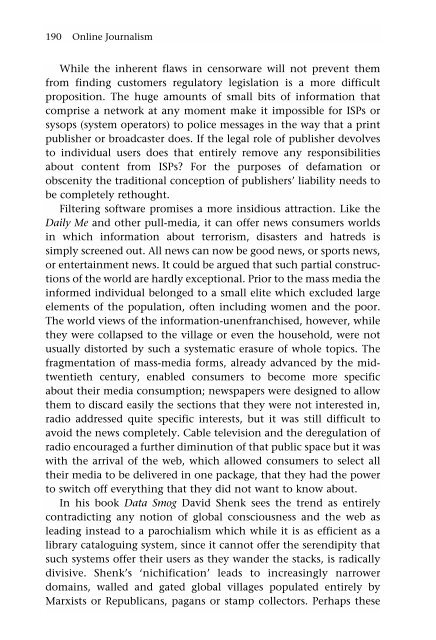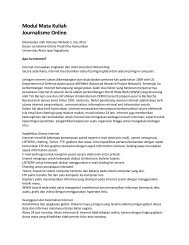Online Journalism - Ayo Menulis FISIP UAJY
Online Journalism - Ayo Menulis FISIP UAJY
Online Journalism - Ayo Menulis FISIP UAJY
Create successful ePaper yourself
Turn your PDF publications into a flip-book with our unique Google optimized e-Paper software.
190 <strong>Online</strong> <strong>Journalism</strong><br />
While the inherent flaws in censorware will not prevent them<br />
from finding customers regulatory legislation is a more difficult<br />
proposition. The huge amounts of small bits of information that<br />
comprise a network at any moment make it impossible for ISPs or<br />
sysops (system operators) to police messages in the way that a print<br />
publisher or broadcaster does. If the legal role of publisher devolves<br />
to individual users does that entirely remove any responsibilities<br />
about content from ISPs? For the purposes of defamation or<br />
obscenity the traditional conception of publishers’ liability needs to<br />
be completely rethought.<br />
Filtering software promises a more insidious attraction. Like the<br />
Daily Me and other pull-media, it can offer news consumers worlds<br />
in which information about terrorism, disasters and hatreds is<br />
simply screened out. All news can now be good news, or sports news,<br />
or entertainment news. It could be argued that such partial constructions<br />
of the world are hardly exceptional. Prior to the mass media the<br />
informed individual belonged to a small elite which excluded large<br />
elements of the population, often including women and the poor.<br />
The world views of the information-unenfranchised, however, while<br />
they were collapsed to the village or even the household, were not<br />
usually distorted by such a systematic erasure of whole topics. The<br />
fragmentation of mass-media forms, already advanced by the midtwentieth<br />
century, enabled consumers to become more specific<br />
about their media consumption; newspapers were designed to allow<br />
them to discard easily the sections that they were not interested in,<br />
radio addressed quite specific interests, but it was still difficult to<br />
avoid the news completely. Cable television and the deregulation of<br />
radio encouraged a further diminution of that public space but it was<br />
with the arrival of the web, which allowed consumers to select all<br />
their media to be delivered in one package, that they had the power<br />
to switch off everything that they did not want to know about.<br />
In his book Data Smog David Shenk sees the trend as entirely<br />
contradicting any notion of global consciousness and the web as<br />
leading instead to a parochialism which while it is as efficient as a<br />
library cataloguing system, since it cannot offer the serendipity that<br />
such systems offer their users as they wander the stacks, is radically<br />
divisive. Shenk’s ‘nichification’ leads to increasingly narrower<br />
domains, walled and gated global villages populated entirely by<br />
Marxists or Republicans, pagans or stamp collectors. Perhaps these
















